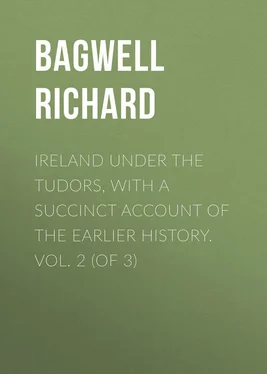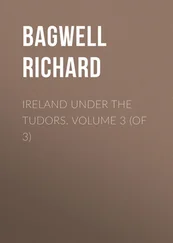Richard Bagwell - Ireland under the Tudors, with a Succinct Account of the Earlier History. Vol. 2 (of 3)
Здесь есть возможность читать онлайн «Richard Bagwell - Ireland under the Tudors, with a Succinct Account of the Earlier History. Vol. 2 (of 3)» — ознакомительный отрывок электронной книги совершенно бесплатно, а после прочтения отрывка купить полную версию. В некоторых случаях можно слушать аудио, скачать через торрент в формате fb2 и присутствует краткое содержание. Жанр: foreign_antique, foreign_prose, Историческая проза, на английском языке. Описание произведения, (предисловие) а так же отзывы посетителей доступны на портале библиотеки ЛибКат.
- Название:Ireland under the Tudors, with a Succinct Account of the Earlier History. Vol. 2 (of 3)
- Автор:
- Жанр:
- Год:неизвестен
- ISBN:нет данных
- Рейтинг книги:4 / 5. Голосов: 1
-
Избранное:Добавить в избранное
- Отзывы:
-
Ваша оценка:
- 80
- 1
- 2
- 3
- 4
- 5
Ireland under the Tudors, with a Succinct Account of the Earlier History. Vol. 2 (of 3): краткое содержание, описание и аннотация
Предлагаем к чтению аннотацию, описание, краткое содержание или предисловие (зависит от того, что написал сам автор книги «Ireland under the Tudors, with a Succinct Account of the Earlier History. Vol. 2 (of 3)»). Если вы не нашли необходимую информацию о книге — напишите в комментариях, мы постараемся отыскать её.
Ireland under the Tudors, with a Succinct Account of the Earlier History. Vol. 2 (of 3) — читать онлайн ознакомительный отрывок
Ниже представлен текст книги, разбитый по страницам. Система сохранения места последней прочитанной страницы, позволяет с удобством читать онлайн бесплатно книгу «Ireland under the Tudors, with a Succinct Account of the Earlier History. Vol. 2 (of 3)», без необходимости каждый раз заново искать на чём Вы остановились. Поставьте закладку, и сможете в любой момент перейти на страницу, на которой закончили чтение.
Интервал:
Закладка:
1. What petitions did Shane intend to make to the Queen when he first proposed to come over?
A. To acknowledge my duty, to become known to her Highness as a protection against unjust Governors, and to become civilised by the sight of her Majesty’s nobility.
R. The implied accusation is too vague.
2. Shane has been profuse in offering his services – what are they?
A. To help the Governor in preventing foreign enemies from landing in the North. Sussex has brought in the Redshanks ‘to the great danger of the Crown of Ireland.’ Their lands should be restored to loyal subjects such as me, O’Neill, and my friends.
R. Judging from Shane’s antecedents, is he likely to perform such a promise?
3. Why should not the Baron’s son be Earl according to his patent?
A. That Kelly was born in wedlock and reputed the son of John Kelly and Alison his wife until sixteen. He was adopted by my father ‘contrary to all order of law and to the old proverb "who bulleth my cow the calf is mine."’ Matthew Kelly was then a trader in Dundalk called ‘Matthew the seller of salt.’ My father rechristened Matthew, ‘Ferdoragh,’ who then tried to usurp the headship of the O’Neills. Even if I were out of the way there are one hundred of my name who would not allow Matthew’s pretensions.
Any patent must be void, for Con had no estate in the country, which was held only by consent of the Lords and inhabitants.
By the law of the Pale no letters patent took effect without inquisition, which could not be held in Tyrone because it was no shire. If ‘the Queen’s law’ is to prevail, then I am heir-at-law.
R. The Baron’s son claims by letters patent, not by legitimation, and the freeholders were consenting parties. Shane’s Pale law is ‘used in shire-ground and not in the Irishry, where the Prince holdeth by conquest, and ever hath done, and the breach thereof overthrows all the new Earls’ states in Ireland.’
4. How he proves his title to be O’Neill, having never been admitted by the sovereign?
A. In Tyrone and most Irish countries the people assemble on the death of a chief and choose ‘the most ablest and the worthiest of the headmen.’ Shane was so elected without the usual contest. His ancestors never used to be confirmed by the Crown, ‘yet none the less do I mean to be as good and true a subject as though any such confirmation were had in that behalf.’
R. The eldest is not accounted the worthiest, but the strongest. Shane forced the country to elect him. There are many precedents for the admission of captains of countries by letters patent, and the practice should of right be universal.
5. What authority and jurisdiction does Shane claim by virtue of tribal election?
A. What my ancestors have always claimed and no more. Most of them have held the pre-eminence by indenture, and the old men of the country will not deny the extent of the jurisdiction.
R. The claim is bad, and more particulars are required.
6. What countries doth Shane claim to rule thereby?
A. Magennis, MacMahon, Maguire, O’Kane, O’Hanlon, MacCartane, Dufferin, the Savages, and many O’Neills are under my rule. Clandeboye and the Rowte should belong to me, ‘which the Scot engageth by the means aforesaid.’ I have also ancient rights over O’Reilly’s country, and rents out of ‘other lords of small reputation which it were prolix to write.’ The old black rent of 40 l. out of Louth was remitted by my father. Whatever men may say, I mean to spend all my power in the Queen’s service.
R. Fuller particulars are required, and records are extant to disprove all these claims.
7. What obedience and service hath O’Neill hitherto borne to the Crown of Ireland?
A. Bare allegiance only to the Lords of Ireland, and peace with the Pale. My father first acknowledged Henry VIII. King of England, France, and Ireland; I do the same ‘with a more perfection’ to serve her Majesty than my ancestors. When I undertook to come I fully knew what influence the Earl of Sussex had with the nobility. Nevertheless, I had ‘hope in the Queen’s Highness and the uprightness of her honourable Council, and my own truth.’ I now crave favour and despatch.
R. All this is false. O’Neill owes great service to the Crown of Ireland as appears by record. 40 40 Articles to be answered by Shane O’Neill, Feb. 7, 1562. His answers, same date. The Earl of Sussex’s reply, Feb. 14.
Other controversies there were of a more personal character between Shane and Sussex; a study of which shows how hopeless it was to suppose that they would ever act together, or be anything but enemies to each other. Shane declared truly enough that Sussex had designs on his life. His charges may be summed up in the statement that he thoroughly mistrusted the Lord-Lieutenant, ‘by reason of which mistrust he hath escaped his traps, by the help of God and grace of the Queen, and now at length come to her gracious presence, which he hath long wished.’ Refuting some charges and denying others, the Earl concentrates his wrath in the supposition ‘that Shane’s nature is so accustomed to lying, as after her Majesty’s gracious dealing with him he is not ashamed to show the same now in her presence;’ and is therefore much less to be trusted when absent. 41 41 Shane’s answers to the Articles of Treason, &c., of June 8, 1561; Feb. 7. Confutation of same, Feb. 14.
That Cecil was anxious to do right in O’Neill’s case may be inferred from the great labour which he evidently took to understand both the legal and moral aspect of the question. The ‘Tower Records’ were searched for precedents as to the Earldom of Ulster, through which Edward IV. and all his successors were entitled to Tyrone, and as to the relations of the Crown with Irish captains. Inquiries into Irish customs were also set on foot with special reference to Shane’s claims under them. His proved rights there was clearly no intention of withholding. But there was culpable procrastination, a hope that something might turn up, and an idea that it was well to keep Shane away from his own country and to accustom his country to do without him. O’Neill clamoured for his release, and produced evidence of the distractions of his country in his absence. Many spoils were taken to the Pale, and many disturbances raised by the Baron of Dungannon’s sons and by other enemies. Tirlough Luineach took too much on himself; ‘and the sept of the Neills,’ said the chief’s correspondent, ‘do not maintain one another but are scattered abroad, every one doing for himself, and the "kereaghts" of the country (the nomad herdsmen of Ulster) in every side are dropping away to eschew the trouble of the country … every man spake largely for the defence of the country at your being with them, yet is the country now evil defended. It is easier to redress now than hereafter, therefore come in haste and do as the proverb says, "Principiis obsta; sero medicina paratur," come with haste and you shall be welcome.’ 42 42 Brief collection of material points, Feb. 14; Private Memoranda by Cecil, March 1562 (No. 43); nameless correspondent to Shane O’Neill, March 21, with a note by Shane for the Council referring to other letters.
The Queen not unreasonably declared that she could not decide fairly in the young Baron’s absence; but this should have been thought of before. About the time the order to send him reached Ireland the question was settled as between Shane and his nephew, or supposed nephew, by the murder of the younger claimant to the Earldom of Tyrone. Tirlough Luineach, who was probably tanist, and was certainly the second man among the O’Neills, waylaid the unfortunate boy before daybreak with 100 horse and 200 foot, somewhere between Carlingford and Newry. The victim had no more than twenty with him. He hid in a thicket, and stripped off his clothes, intending to swim the river, when the pursuit slackened. But one of his followers who was taken offered, to save his own life, to betray a better person. His hiding-place was soon found, and he was killed, ‘not far, as I think,’ said Fitzwilliam, ‘from the spot where his father had the like friendship of his men.’ Brian O’Neill left a brother behind him, who was neglected on account of his youth, but who lived to be the most formidable of all Elizabeth’s Irish enemies. The murder could not be traced to Shane; and indeed Tirlough, as his presumptive successor, had an interest of his own in getting rid of a pretender who relied on letters patent. Under Tirlough’s leadership the O’Neills did nearly as much harm as when Shane was present, and the last crime was considered evidence that no one but the latter could keep order. 43 43 Fitzwilliam to Cecil, April 23, 1562. The murder is not mentioned by the Four Masters .
Интервал:
Закладка:
Похожие книги на «Ireland under the Tudors, with a Succinct Account of the Earlier History. Vol. 2 (of 3)»
Представляем Вашему вниманию похожие книги на «Ireland under the Tudors, with a Succinct Account of the Earlier History. Vol. 2 (of 3)» списком для выбора. Мы отобрали схожую по названию и смыслу литературу в надежде предоставить читателям больше вариантов отыскать новые, интересные, ещё непрочитанные произведения.
Обсуждение, отзывы о книге «Ireland under the Tudors, with a Succinct Account of the Earlier History. Vol. 2 (of 3)» и просто собственные мнения читателей. Оставьте ваши комментарии, напишите, что Вы думаете о произведении, его смысле или главных героях. Укажите что конкретно понравилось, а что нет, и почему Вы так считаете.












